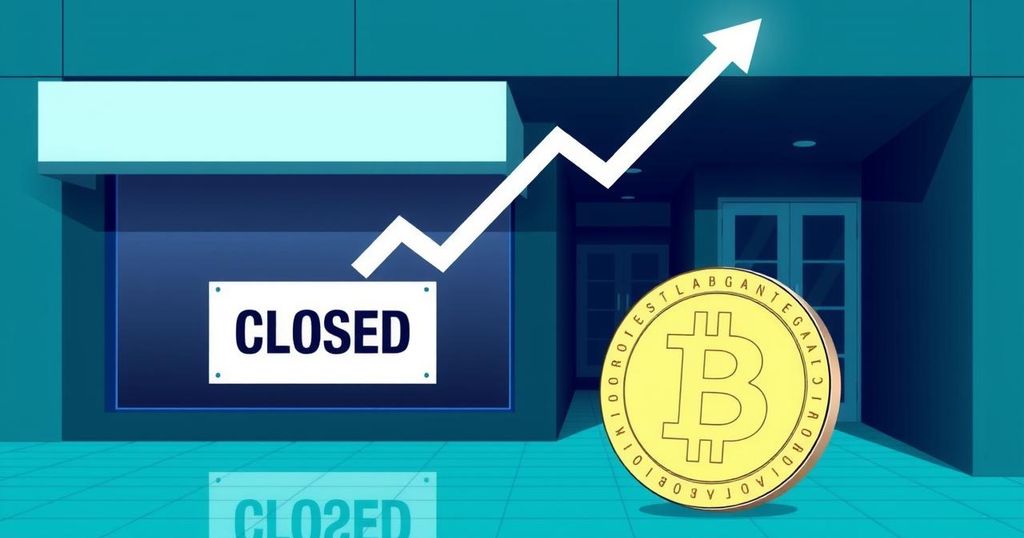Bitcoin Faces Increased Short-Term Volatility Amid Rising U.S. Treasury Yields
Bitcoin has recently dipped below $90,000 and could face further volatility in the short term due to rising U.S. Treasury yields and macroeconomic factors. Analysts from Bitfinex Alpha note increased opportunity costs for investors holding Bitcoin, leading to portfolio rebalancing towards safer assets. As a result, Bitcoin’s price adjustments are expected to be rapid amid these economic shifts, despite potential long-term stabilization from future U.S. administration policies.
Recent fluctuations in Bitcoin’s (BTC) market performance have placed it under considerable scrutiny, particularly as it dipped below the $90,000 threshold. Analysts are forecasting heightened volatility in the near future, as macroeconomic trends exert downward pressure on the cryptocurrency. According to a report from Bitfinex Alpha, various factors, including tightening financial conditions, reduced expectations for Federal Reserve rate cuts, and the impending liquidation of $6.5 billion in BTC authorized by the Justice Department, have contributed to this downturn. Compounding these challenges, there has been a notable rise in U.S. Treasury yields, which is anticipated to further influence Bitcoin’s price dynamics.
The recent spike in the 10-year U.S. Treasury yields, reaching 4.79%—the highest level in 14 months—could significantly reshape investment strategies. Previously, in April 2024, when yields briefly exceeded 4.6%, Bitcoin’s price plummeted to around $73,000, and it remained absent from this price point for several months thereafter. The analysis from Bitfinex underscores that the ascent in Treasury yields is not only impacting traditional markets but also driving conservative investors to pivot towards lower-risk government bonds that offer improved returns compared to cryptocurrencies.
As institutional investors reassess their portfolios, the rising yields present an increased opportunity cost for holding Bitcoin, leading to capital extraction from cryptocurrency investments in favor of more stable yield-generating assets. The tightening financial conditions linked to these higher yields are also likely to constrict overall liquidity in financial markets, making borrowing more expensive. Consequently, the diminished capital influx into speculative investments, such as cryptocurrencies, is expected to continue in the immediate future, with diversified investors reallocating their resources from crypto assets into bonds.
Bitcoin’s inherent volatility means it often responds more rapidly to these macroeconomic shifts than traditional equities. For instance, while the S&P 500 may take one to three months to react, Bitcoin tends to adjust its pricing within a matter of weeks, particularly under speculative conditions. Recent data indicates a concerning trend, with net outflows recorded among U.S. spot Bitcoin exchange-traded funds (ETFs), displaying negative flows in seven of the previous twelve days. Despite this turbulent market outlook, Bitfinex maintains a cautiously optimistic view, suggesting that an incoming U.S. administration could mitigate deeper losses and sustain Bitcoin’s long-term viability.
The cryptocurrency market, particularly Bitcoin, is heavily influenced by macroeconomic factors, including interest rates and government policies. Recently, Bitcoin experienced significant volatility partially driven by a surge in U.S. Treasury yields. When yields rise, they signal a more stable investment environment with increased returns from low-risk assets, thereby affecting the attractiveness of cryptocurrencies. Understanding these dynamics is crucial for investors navigating the current financial landscape, especially given the interplay of market reactions to interest rate changes and liquidity effects on speculative investments.
In summary, Bitcoin is poised for increased volatility in the short term due to macroeconomic pressures, particularly rising U.S. Treasury yields and changes in Federal Reserve policy. As institutional investors reassess their portfolios in light of these developments, Bitcoin’s inherent sensitivity to liquidity conditions could lead to immediate price adjustments. Nevertheless, the potential stabilization of the political landscape could provide a buffer against further declines, preserving Bitcoin’s long-term prospects.
Original Source: cryptopotato.com







Post Comment